Photovoltaics, an alternative to unlocking the energy market

The main reason why many countries liberalized their power sectors and unbundled vertically integrated utilities was to introduce competition in the generation sector as well as to attract new investors in this activity. However, this process has been followed with different speeds, and the need to find a model is faced by hundreds of experts from across the globe over the past twenty-five years, to overcome this not easy task.
In practice, for the Western Balkans countries there is a strong correlation among the binomial of the opening of the market as an essential obligation to comply with the international commitments, and the possibility that this offer on the increase use of alternative technologies, not only for businesses but also by each family.
The above is particularly for Albania, because electricity, as a commodity distributed in the network, whose value is mainly related to the place and time at which it is available. In this sense, the country has a significant potential of renewable energy, well distributed throughout the territory among the many hydroelectric and photovoltaic sources, and above all the average of network losses are bigger than any other European country.
From many years, the country, in the context of pan-European developments regarding electricity supply, is on the verge of beginning a free market that will be fully shaped by the dynamics of telematics exchanges (PXs). Notwithstanding a lot of steps taken, still the last Secretariat’s WB6 report on electricity points a lack of progress notable with respect to wholesale and retail market opening needed.
Following, the Secretariat initiated a dispute settlement case on the lack of distribution system operator unbundling in January 2018, formally only one week before, the distribution was legally and functionally unbundled by supply, within the state-owned joint stock company OSHEE. By the other part, the transmission system operator result already unbundled and certified by April 2017.
In same time, base to market model in force, there is a gradual scheduling of enter in market of the consumers according to access tariffs, related to the different level of access, provide by DSO and approve by the authority of energy. A process that has accumulate a strong delay and has been stalled for an interim period of two years until a market will takes place.
Seen that the above liberalisation and alternative supply should take time to come to practice, the above can be overcome by boosting the possibility for self-generation. The new REs law have already opened the way for the network to receive energy input produced by businesses and households by generating distributed resources based on the net energy measurement scheme.
To accomplish the above, the energy authority (ERE) should play a key role in enforcing the distribution operator (OSSH) to complete the administrative procedure, especially technical automation to ensure the efficiency of the transition of the consumers from traditional to alternative energy supply.
Then the above will give the possibility of the consumers, that are interested, to accessing in a proactive way in generating energy for their needs. An open up process that will boost a development through new and more efficient economic model, more resource-oriented, proactive consumption, cutting down the emissions and the best protected of natural environment, etc.
Thus, in conclusion, the above difficulty to break the monopoly can be translated into a catalyst for the development of the use of alternative energy technologies, starting by the production of energy from photovoltaic as a technology already mature and in hand of business but what is more important to the family customer.
Scan, 13.04.2018


